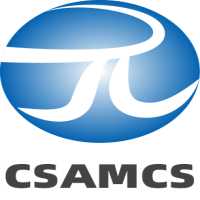
Prof. Wanyang Dai

Prof. Wanyang Dai
Nanjing University,China
Title: Quantum entanglements and performance modelling for quantum computers
Abstract:
We study quantum entanglements and performance modelling for quantum computers through deriving a general spherical coordinate formula for a quantum state of n-qubit register. The associated angle-based n-qubit operation rules on a (n+1)-manifold are established to help developing (e.g., cold atom based) quantum computers, which are simple and efficient in the sense that they reduce the complicated quantum multiplication and division operations to simple addition and subtraction operations just like those used in a conventional computer. The rules for n-qubit operations are realized through measurement-filtering based feedback controls and quantum entanglements with the aim to develop scalable quantum computer chips. The performance models are also derived through the scaling limits (called reflecting Gaussian random fields on a manifold) for n-qubit quantum computer-based quantum storage systems.
Biography:
Wanyang Dai is a Distinguished Professor in Mathematics Department of Nanjing University, Chief Scientist at Su Xia Control Technology, President and CEO of U.S. based (blochchain and quantum computing) SIR Forum (Industial 6.0 Forum), a Special Guest Expert in Jiangsu FinTech Research Center, President of Jiangsu Probability & Statistics Society, Chairman of Jiangsu Big Data-Blockchain and Smart Information Special Committee, Chief Scientist at Depths Digital Economy Research Institute, and Editor-in-Chief of Journal of Advances in Applied Mathematics, where his research includes stochastic processes related optimization and optimal control, admission/scheduling/routing protocols and performance analysis/optimization for various projects in BigData-Blockchain oriented quantum-cloud computing and the next generation of wireless and wireline communication systems, forward/backward stochastic (ordinary/partial) differential equations and their applications to queueing systems, stochastic differential games, communication networks, Internet of Things, financial engineering, energy and power engineering, etc. His “influential” achievements are published in “big name” journals including Quantum Information Processing, Operational Research, Operations Research, Computers & Mathematics with Applications, Communications in Mathematical Sciences, Journal of Computational and Applied Mathematics, Queueing Systems, Mathematical and Computer Modeling of Dynamical Systems, etc. His researches are awarded as outstanding papers by various academic societies, e.g., IEEE Top Conference Series, etc.. He received his Ph.D degree in applied mathematics jointly with industrial engineering and systems engineering from Georgia Institute of Technology, Atlanta, GA, U.S.A., in 1996, where he worked on stochastics and applied probability concerning network performance modeling and analysis, algorithm design and implementation via stochastic diffusion approximation. The breakthrough results and methodologies developed in his thesis were cited, used, and claimed as “contemporaneous and independent” achievements by some other subsequent breakthrough papers that were presented as “45 minute invited talk in probability and statistics” in International Congress of Mathematicians (ICM) 1998, which is the most privilege honor in the mathematical society. The designed finite element-Galerkin algorithm to compute the stationary distributions of reflecting Brownian motions (weak solutions of general dimensional partial differential equations) is also well-known to the related fields.